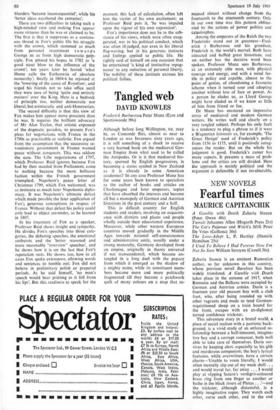Tangled web
DAVID KNOWLES
Frederick Barbarossa Peter Munz (Eyre and Spottiswoode 90s) Although before long Wellington, NZ, may be, as Concorde flies, almost as near to London as was Inverness sixty years ago, it is still something of a shock to receive a very learned book on the mediaeval Ger- man Empire from what used to be called the Antipodes. Or is it that mediaeval his- tory, spurned by English progressives, is becoming a status symbol in New Zealand as it is already in some American academies? In any case Professor Munz has for some years been known to specialists as the author of books and articles on Charlemagne and later emperors, topics that have absorbed the interests and become all but a monopoly of German and Austrian historians in the past century and a half.
This is difficult country for English students and readers, involving an acquaint- ance with districts and places and people wholly outside their educational experience. Moreover, while other western European countries moved gradually in the Middle Ages towards national self-consciousness and administrative unity, usually under a strong monarchy, Germany developed from an empire, originally in theory universal if not transcendental, which became en- tangled in a long duel with the papacy from which it emerged as the shadow of a mighty name, while its constituent mem- bers became more and more politically fragmented till they became a patchwork quilt of many colours on a map that re- masted almost without change from the fourteenth to the nineteenth century. Only in our own time was this pattern obliter- ated by the actions of power politics and catastrophes.
Among the emperors of the Reich the two Fredericks stand out in greatness—Fred- erick i Barbarossa and his grandson, Frederick n, the world's marveL Both have attracted and baffled great historians, and on neither has the decisive word been spoken. Professor Munz sees Barbarossa as an extremely able man, with physical courage and energy, and with a mind fer- tile in policy and capable, almost to the point of genius, of abandoning a favourite scheme when it turned sour and adopting another without loss of face or power. As a person he eludes us, as Lloyd George might have eluded us if we knew as little of him from friend or foe.
Dr Munz has mastered an impressive array of mediaeval and modern German writers. He writes well and clearly on a very tangled subject. Perhaps his only fault is a tendency to plug a phrase as if it were a Wagnerian leitmotiv as, for example, 'The Great Design' used of Frederick's policy from 1156 to 1175, until it positively antag- onises the reader. But on the whole his judgment is good. Frederick's career has many aspects. It presents a mass of prob- lems and the critics are still divided. Here the approach is mainly political and the argument is defensible if not invulnerable.


































 Previous page
Previous page